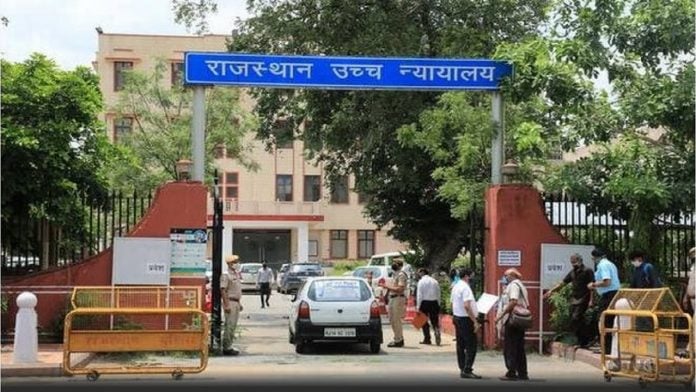The Rajasthan High Court dismissed a Public Interest Litigation (PIL) filed alleging irregularities and substandard construction of the National Highway No.14 “Beawar- Pali Pindwara” Section.
The PIL has been filed with the following prayers:
“i) Issue a writ, order or direction of like nature to direct CBI or SIT Investigation/ enquiry in poor quality of construction, issuance of provisional work completion certificate in 2015 and toll collection without completion of project of PaliPindwara Section NH-14 till date;
ii) Direct recovery of compensation from the concessionaire of Rs.14.91 crore which was imposed on dt.09.09.2016 by Project Director, National Highways Authority of India Limited (NHAI) along with interest with penal action against the responsible officers;
iii) Direct recovery of compensation and penalty from the concessionaire from October 2016 to July 2021 for non completion of project as per Article 14.4 of Contract Agreement. Also the officers responsible for not operating the Article 14.4 of Contract Agreement and for acceptance of sub-standard work should also be held responsible.
iv) Direct recovery of collected sum of Rs.1913.59 crore as a toll collection from Pali-Pindwara Section only by December 2020 without completion of the project;
v) Direct payment of compensation to all sufferers of accidents of the nature of fatal, serious and minor injuries.”
The petitioner has placed on record various documents pertaining to the construction activities of the said Highway and relies upon certain communications/ notices regarding shortcomings/defects pointed out by the officers of the National Highway Authority of India (NHAI) and the order of penalty imposed upon the Concessionaire. In this regard, the petitioner has also relied upon the Unstarred Question dated 22.03.2021 put up by the Member of Parliament before the Rajya Sabha.
While considering the PIl , the Division Bench of Justice Sandeep Mehta and Justice Kuldeep Mathur held that primarily, three fold submissions were advanced by the counsel representing the petitioner beseeching the Court to exercise its PIL jurisdiction i.e.
(i) the faulty construction of the Highway,
(ii) the operation thereof in the alleged breach of terms of the contract and
(ii) award of compensation for the fatalities which have taken place on the Highway in question allegedly because of its faulty design.
At the outset, the High Court noted here that the construction of the Highway in question is being undertaken under a Concession Agreement dated 22.06.2011 the terms whereof are binding on the parties. Hence, the Court, while exercising its powers of judicial review, would be loathe to enter into the issues arising from purely contractual obligations of the parties.
It is further noted by the High Court that aspect regarding imposition of penalty by the NHAI upon the concessionaire owing to non-adherence to the time schedule and non-compliance of the check list, the matter is admittedly subjudice before the competent authority which is authorised to examine such issues as per the agreement itself.
“Thus, venturing into these issues in a purported exercise of PIL jurisdiction, would amount to premature and unwarranted interference in the jurisdiction of a competent authority and hence, it is apparent that the said prayer made in the writ petition is untenable and unworthy of acceptance”, observed the Court.
Regarding the allegation that the concessionaire has not executed the work of road in question in terms of the Concession Agreement, the Court said that the Concession Agreement itself, stipulates the consequences of non-adherence to the terms and conditions thereof and all actions, if so required, would have to be taken in light thereof.
The Court further said that whenever, the NHAI proposes to take any action against the concessionaire on the basis of certain sets of facts and allegations which are disputed, a resolution mechanism is provided in the Concession Agreement itself and hence, there would be no justification whatsoever for this Court to delve into the issues arising from the breach of terms and conditions of the contract in the purported exercise of writ jurisdiction.
“Thus, this prayer made in the writ petition cannot be acceded to. In this regard, the ratio of the judgment rendered in the case of Soma Isolux NH One Tollway Private Limited (supra) clearly defines the peripheries in which such jurisdiction can be exercised. In the facts and circumstances noted above, we are of the firm opinion that the present one is not a case warranting invocation of the jurisdiction of Public Interest Litigation so as to interfere in the contractual issues between the parties”.
Regarding the contention that many people have lost their lives on account of accidents which have taken place on the subject Highway because of its faulty design, the allegation is totally fallacious as it is not supported by any material whatsoever , find the Court.
Though the statistics placed on record by the petitioner do indicate that some accidents have taken place on the Highway in question, the petitioner has not been able to substantiate the allegation that these accidents have occurred because of faulty design of the Highway. In order to prove this allegation and to satisfy the Court regarding the faulty design, the petitioner would have to present unimpeachable scientific evidence , held by the High Court.
“However, apart from a bald allegation, nothing has been placed on record which can even barely support the allegation so made. It is evident that the petitioner’s brother (Member of Parliament) tried to raise these very issues through an unstarred question in the Rajya Sabha proceedings but, apparently, the issue so raised did not fetch the desired result and hence, it can be presumed that the complaint made in this regard is devoid of any substance. It is also apparent that when the attempted interference in the construction of the road failed before the Parliament, the petition was filed through the petitioner”, the Court observed.


